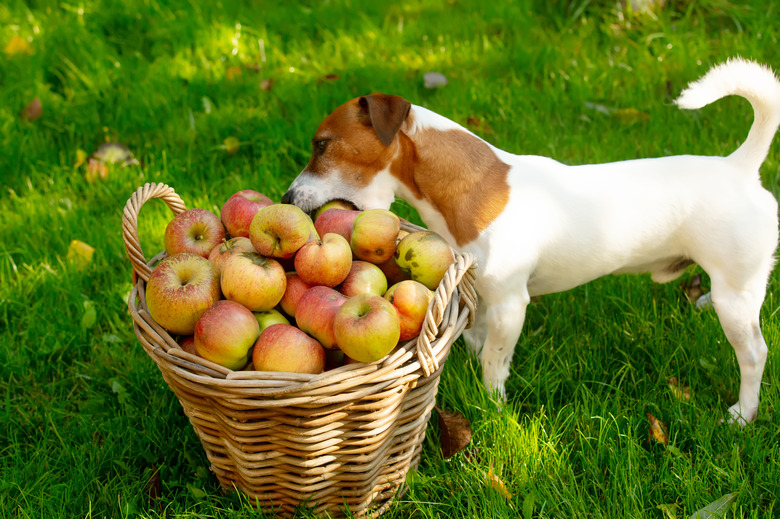Can Dogs Have Apple Cider?
Fall has become synonymous with pumpkin spice, but before the lattes, pastries, and candle scents, there was one seasonal food that signified those cooler changes in temps better than anything — apple cider. Served cold or hot, apple cider is a beverage enjoyed by many, and in addition to it's great taste comes with health benefits as well. Dog guardians who like to share treats with their canine friends may wonder if it's safe to allow their dogs to enjoy apple cider too, which can be done, although it may not be the best choice for some dogs.
Where does apple cider come from?
Where does apple cider come from?
Apple cider, put simply, is just juiced apples. Unlike apple juice, however, apple cider is unfiltered and may be served pasteurized or unpasteurized, meaning it may or may not have been heated to a temperature that kills bacteria. Apple cider generally contains more pulp than apple juice, and therefore more fiber, and is also loaded with vitamins and minerals. The first recorded apple trees were found along the Nile River in 1300 BC, and the earliest cider was alcoholic after allowing the juice from apples to ferment. Today, apple cider is either fermented and enjoyed as hard cider, or sold as a sweet juice-like beverage for people of all ages to enjoy.
Can dogs have apple cider?
Can dogs have apple cider?
Technically, yes, dogs can have apple cider, but whether they should is a different issue. First, most dogs will probably not enjoy apple cider for its excessive sweetness, which canines don't generally crave. Some apple cider doesn't contain added sweetener since apples are already sweet as they are, but if the brand you're thinking of giving your canine does contain added sugar, it's best to resist sharing it with your dog.
Health benefits of apple cider for dogs
Health benefits of apple cider for dogs
Like the old saying, "an apple a day keeps the doctor away," apple cider also comes with its fair share of health benefits. In fact, the nutritional value of apple cider is quite similar to that of apples, minus the fiber content. Apple cider is known to contain vitamins A and C, along with potassium, iron, and calcium, and are rich in polyphenols, all of which are great for dogs. Vitamin A helps dogs with immune and cell function, and vitamin C is full of antioxidants, which can help with inflammation. As far as the mineral content in apple cider, pets would need to ingest a large amount of the stuff to see any real nutritional benefits, and most likely already reach their minimum daily requirement from the foods they eat.
The best ways to feed apple cider to dogs
The best ways to feed apple cider to dogs
Apple cider contains a number of health benefits, and it's not wrong to want to pass some of these onto your dog. One safe and healthy way to do so is to look at apple cider-related items, namely, apple cider vinegar, which can be used in a number of ways to supplement a dog's diet. The most common way to add apple cider vinegar into a dog's diet is to add a tablespoon or two to their water, as apple cider vinegar should always be diluted when ingesting anyway. Despite claims on many natural pet care websites, the true health benefits of apple cider vinegar for dogs isn't really known, so it's advised that you consult with your veterinarian before making changes to your dog's diet, especially if you think it may be an ongoing occurrence.
Are there any concerns with feeding apple cider to dogs?
Are there any concerns with feeding apple cider to dogs?
Apple cider can contain a high amount of sugar, both naturally occurring and added, depending on the brand of cider you're drinking. Additionally, apple cider vinegar is likely too acidic for dogs with kidney disease, and should not be given without consulting a medical professional. Finally, if you keep your dog on a homemade diet, utilizing apple cider or apple cider vinegar for its vitamin or mineral content alone will not be enough to keep a dog healthy, so look to foods like bone meal, carrots, and parsley as additions to non-commercial meals.
Conclusion
Conclusion
Apple cider is safe for pets to ingest, although most dogs won't enjoy it for it's slightly sour taste. If you opt to feed your dog apple cider, be sure to keep an eye out for the sugar content, and if added sugars are present it's probably best to pass. If you're thinking of using apple cider as a dietary supplement for your dog, the minimal amount of vitamins and minerals found in the small amount you would feed your dog probably won't make it worth it. As with any addition to a dog's dietary regimen, always consult your veterinarian before making changes to your dog's diet.
Looking for more information about canine diets? Click here to check out our list of foods dogs can and cannot eat.


